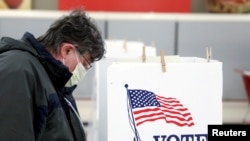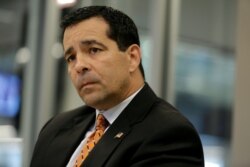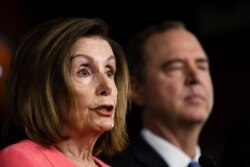Russia, China and Iran are all actively meddling in U.S. presidential politics hoping to persuade American voters to put their preferred candidate in the White House, according to an extraordinary warning from Washington’s top counterintelligence official.
National Counterintelligence and Security Center Director William Evanina said U.S. intelligence indicates that all three countries are hoping to sow further divisions in the United States and “undermine the American people’s confidence in our democratic process.”
But he said Russia, China and Iran are divided over whom they would like to see win the presidential contest in November: President Donald Trump or his Democratic challenger, former Vice President Joe Biden.
“We assess that Russia is using a range of measures to primarily denigrate former Vice President Biden and what it sees as an anti-Russia ‘establishment,’” Evanina said in Friday’s statement. He described Moscow’s approach as consistent with the Kremlin’s criticism of Biden and former U.S. President Barack Obama.
“Some Kremlin-linked actors are also seeking to boost President Trump’s candidacy on social media and Russian television,” Evanina said, adding China and Iran appear to be seeking to help Biden.
Speaking hours later, the president disputed key parts of the intelligence community’s assessment.
“The last person Russia wants to see in office is Donald Trump because nobody's been tougher on Russia than I have, ever," the president told reporters at a hastily called and wide-ranging news conference at the Trump National Golf Club in Bedminster, New Jersey. "I don't care what anybody says."
Trump also appeared to contradict the National Counterintelligence and Security Center (NCSC) assessment about whether Russia, China, Iran or other countries might be able to change the vote.
According to the statement by the NCSC’s Evanina, while those countries will likely seek to compromise the vote count, “it would be difficult for our adversaries to interfere with or manipulate voting results at scale.”
Trump, though, called that threat “a big problem.”
"The biggest risk that we have is mail-in ballots" he said. “Whether it's Russia or China, Iran, North Korea, many others … it's much easier for them to forge ballots and send them in. It's much easier for them to cheat."
This is not the first time Trump has clashed with U.S. intelligence agencies over their assessments, particularly when it comes Russia.
He has long disputed the intelligence community’s 2017 finding that Russia, at the direction of President Vladimir Putin, “aspired to help President-elect Trump’s election chances when possible” during the 2016 U.S. presidential campaign, calling it a “hoax.”
Trump also lashed out at his intelligence chiefs on Twitter last year, calling them "extremely passive and naïve” and saying they, “should go back to school.”
But despite the president’s assertions, the NCSC assessment said there is evidence Russia would prefer Trump over Biden.
In his statement, Evanina singled out pro-Russian Ukrainian lawmaker Andriy Derkach, accusing him of spreading “claims about corruption” and of publicizing leaked phone calls in an effort to undermine Biden and the Democrats.
When it comes to China and Iran, however, the top U.S. counterintelligence official believes Trump is right, and that both countries would prefer to see U.S. voters elect a new president.
“We assess that China prefers that President Trump – whom Beijing sees as unpredictable – does not win reelection,” Evanina said.
“It has harshly criticized the [Trump] administration’s statements and actions on Hong Kong, TikTok, the legal status of the South China Sea, and China’s efforts to dominate the 5G market,” he said. “Beijing recognizes that all of these efforts might affect the presidential race.”
As for Tehran, Evanina said its online disinformation efforts appear to be “driven by a perception that President Trump’s reelection would result in a continuation of U.S. pressure on Iran in an effort to foment regime change.”
The detailed assessments of the ongoing attempts by Russia, China and Iran to influence the U.S. presidential election come two weeks after the NCSC issued a broad warning about foreign interference in the 2020 election.
It also follows confirmation that counterintelligence officials have been briefing both the Trump and Biden campaigns, at least since last month, about the evolving threat landscape.
At the time, Biden said he was told about both Russian and Chinese efforts to impact the election, warning Moscow would have "a real price to pay" if he is elected.
High-ranking Democrats such as House Speaker Nancy Pelosi, have been calling on intelligence officials to share more details with lawmakers and the public.
In a statement Friday, Pelosi and House Intelligence Committee Chairman Adam Schiff called the NCSC threat assessment an improvement but said it was not enough.
“Unfortunately, today’s statement still treats three actors of differing intent and capability as equal threats to our democratic elections,” they said. “The American people must be provided with specific information that would allow voters to appraise for themselves the respective threats posed by these foreign actors, and distinguish these actors’ different and unequal aims, current actions, and capabilities.”
The leaders of the Senate Intelligence Committee, however, took a more optimistic view.
“One of the main lessons of 2016, as highlighted by our committee’s three-and-a-half-year bipartisan investigation into Russia’s attempts to interfere in that election, was that one of the best ways to combat such efforts is to share with the voting public as much information about foreign threats to our elections as possible,” acting Chairman, Republican Marco Rubio, and Vice Chair, Democrat Mark Warner, said in a joint statement. “[NCSC Director] Evanina’s statement today moves us closer to that goal.”
Friday’s threat warning may not be the last. U.S. intelligence officials say they will continue to declassify information and update the public as they can, while also continuing to provide classified briefings to the candidates and lawmakers.
Some analysts who have long been studying foreign influence efforts say such additional updates, especially for the public at large, could be critical for U.S. voters to avoid falling prey to the ongoing campaigns of interference.
“Without specific examples, for those who don't spend their days knee-deep in disinformation, it's going to be hard to identify,” said Nina Jankowicz, a disinformation fellow at the Wilson Center’s Science and Technology Innovation Program.
Still, U.S. government officials charged with helping to secure the November 3 election have voiced a determined optimism.
"I've said it before and I'll say it again. The 2020 election will be the most secure election in modern history,” Chris Krebs, the director of the U.S. Cybersecurity and Infrastructure Security Agency (CISA) said last month.
But CISA and other federal and state agencies, including the Election Assistance Commission (EAC) and the National Association of Secretaries of State, have also worked to alert voters that just because the election will be secure does not mean results will come as quickly as they have in the past.
“With more Americans voting absentee, it will take longer to tabulate and report complete results," they said in a statement issued last week. “Be patient and remember that your state and local officials are the best sources for trusted and accurate information about voting, Election Day procedures and official results."
VOA Senior White House Correspondent Patsy Widakuswara contributed to this story.






